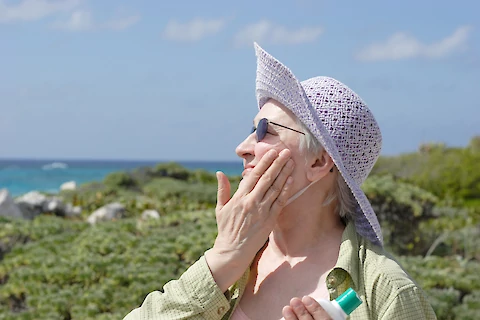
Protecting our senior loved ones from the harmful effects of the sun is a concern often overlooked until it is too late. Family caregivers are vital in ensuring their aging skin is adequately cared for and shielded from damaging UV rays. Every exposure to the sun counts, including a sunny day at the park, a casual gardening session, or just a quick stroll to the mailbox. This Senior Helpers blog post offers a guide to the dos and don'ts of sunscreen application for seniors and how to keep our loved ones safe under the sun.
Why Sun Protection Matters
Skin becomes more sensitive to the effects of the sun as we age. It is thinner, less elastic, and more susceptible to sun damage than younger skin. Sunburn is painful and can lead to severe health complications like skin cancer. Sun exposure can also exacerbate other skin conditions, including rosacea and psoriasis. Sunscreen allows seniors to spend more time outdoors without worrying about sunburn or skin damage.
Know the Different Types of Sunscreen
Understanding the different types of sunscreen available is the first step in protection. There are two main types — chemical and physical sunscreens. Chemical sunscreens absorb the sun's rays and convert them into heat. Physical sunscreens, also known as mineral sunscreens, sit on the skin's surface and reflect the sun's rays. Each type has its advantages. Chemical sunscreens are usually easier to apply and are less visible on the skin. Physical sunscreens are gentler and less likely to irritate sensitive skin, a common characteristic in seniors.
Choose the Best Sunscreen
The best place to start is by choosing the right sunscreen. Dermatologists recommend sunscreen with an SPF (Sun Protection Factor) of 30 or higher. SPF refers to the amount of UVB radiation protection the sunscreen offers. It is also crucial to pick a sunscreen labeled "broad-spectrum." This label means it protects against UVA and UVB rays, which can cause skin cancer.
Apply Sunscreen Correctly
Applying sunscreen correctly is just as important as the type you choose. It should be applied generously to all exposed skin, including often-forgotten areas like the ears and back of the neck. Always apply it at least 20 minutes before going outside to allow maximum absorption. Be sure to apply a thick, even layer because a thin spread might not be protective enough. Sunscreen should be reapplied at least every two hours. Apply more often if your loved one is sweating or swimming. Water-resistant sunscreens should also be reapplied after getting wet.
The Role of Family Caregivers
Family caregivers need to be vigilant about their loved ones' sun protection. Assist them in applying sunscreen if necessary and provide them with hats and other sun-protective clothing. Always encourage them to seek shade during the sun's peak hours. Your efforts can go a long way in maintaining their skin health and overall well-being.
Senior Helpers Offers Personalized Care
Senior Helpers provides quality, in-home care services for seniors and their families in our communities. If you live in Harleysville, Lansdale, Quakertown, or Worcester, contact us at Senior Helpers Lansdale today for assistance and support in caring for your senior loved ones. We understand the importance of protecting our seniors from the sun and are happy to help.